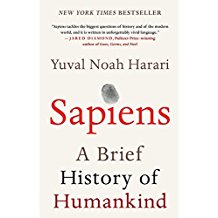
I first encountered the Israeli professor on BBC TV’s programme Talking Books. He was being interviewed about Sapiens. I was entranced by the professor, hypnotised by his easy delivery of the most sparkling new ideas . Whilst watching, I felt as if fireworks were going off inside my mind! I’d never seen/heard anybody like him. Let me reiterate: I wasn’t mesmerised by his good looks, (sorry Prof!) but by his words and ideas. For weeks I raved on about Prof YNH, to anybody who would listen. I instantly dashed on line and bought both his books.
So why did A Brief History (not so brief let me tell you, checking in at 443 pages) languish so long in my TBR pile? I started the book soon after it arrived, but found it wasn’t a quick read, for all its fluency and excitement. And then I discovered it wasn’t a book I could put down/pick up/ put down … repeat cycle. Maybe other readers could do this, but I couldn’t.
Recently a friend told me she had tackled and finished the book by determinedly reading 30 pages a day. So I gave her technique a try, and it worked. I loved the book. Finally, a writer who has the breadth and ability to convey grand global historical themes and events over millennia. What’s more, he delivers the information in an easy readable style, without clogging up the flow with a million dates.
When I recall how we laboured with History when I was at school! It was a Date Fest from start to finish. Don’t get me wrong. I liked studying History, but back in the late 1950s it was presented in a thoroughly boring, dry way, with a huge emphasis on dates. We had to commit long lists of dates to memory. All of which are now burnt-out synapses in my elderly brain. Furthermore, I don’t recall being shown a global perspective of whatever period we were studying. Europe and the Napoleonic Wars, I think was the era we were struggling through. Years later I remember seeing a chart that highlighted key dates of major events, not only in Europe but across Asia, Africa and the Americas as well. What a revelation to me! Our school focus was channeled into a very narrow tight tunnel.
Sapiens is a stimulating and challenging read. I found the section on industrialised factory farming and the way our food is produced, very very disturbing.
In another challenging chapter “And they all lived happily ever after” he proposes that our capacity for happiness is hardwired into us by our biological systems. According to him, our happiness quotient operates between a fixed range, resulting in those of the innately cheerful disposition and its opposite, the gloomy disposition. He says that Philosophy, Art, Religion , the Self-Help industry can only have a temporary ameliorating effect. That chapter certainly made me stop and think.
In relation to the so-called ‘lessons of history’ he throws in a final comment at the end of the section … and yet no one saw the coming of the Internet. How true. And how radically it has changed our lives. So maybe the Future is truly unimaginable. His end chapters keep repeating this theme, that due to advances in genetic and biological engineering maybe the future of Humankind is truly unimaginable.
I have to interject a note here: WHY don’t we ever take cognisance? I have never understood how WWII could occur within 21 years of the end of WWI; the First World War WWI was fought from 1914 to 1918 and the Second World War [or WWII] was fought from 1939 to 1945.
So, thank you, Professor Harari, for joining the dots right from the dawn of time 13.5 billion years ago up to the 21st century, making our history accessible, and enlightening.
I need to finish off by saying that I’m not a student of History by any means. I’m a general reader of eclectic taste. So perhaps my observations in this review are way off target, or wildly wrong. So be it. Another reviewer reported that when they were asked “what’s the book about?” they replied : “ pretty much everything”. Yes, the book takes a wide sweeping view of the Neanderthals, the cognitive, industrial and agricultural revolutions, the rise & demise of empires, the future of Sapiens. Maybe it doesn’t indulge in in-depth analysis but that was just fine, so far as I was concerned. Author Jared Diamond said “It tackles the biggest questions of history and the modern world”. Which it does, and that’s a big, comprehensive read.
If you are open to a challenging and exciting perspective of humankind and our world: read this book.




 My reading hours this month were severely disrupted by frequent trips to the vet, with my ailing companion, Chocolat. Added to this was my own seasonal headcold with its attendant miseries, exacerbated by skirmishes with the plumbing contractor. Overall not a good month.
My reading hours this month were severely disrupted by frequent trips to the vet, with my ailing companion, Chocolat. Added to this was my own seasonal headcold with its attendant miseries, exacerbated by skirmishes with the plumbing contractor. Overall not a good month.